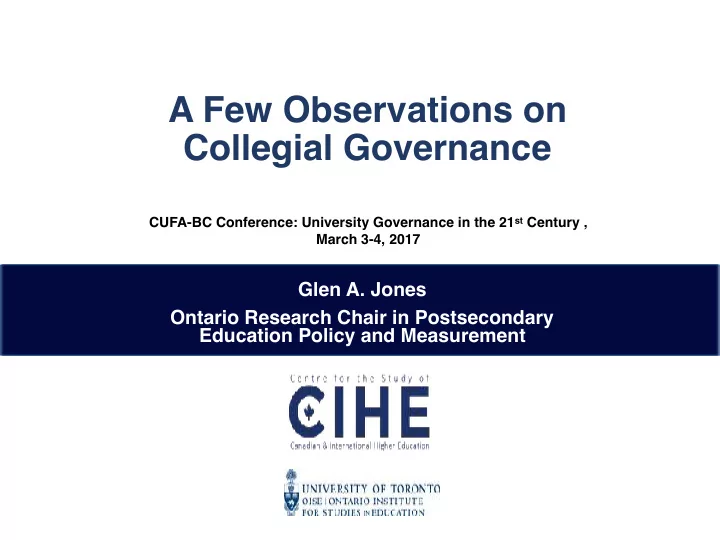

A Few Observations on Collegial Governance CUFA-BC Conference: University Governance in the 21 st Century , March 3-4, 2017 Glen A. Jones Ontario Research Chair in Postsecondary Education Policy and Measurement
Studies that I am drawing on: 1. Ian Austin and Glen A. Jones (2015). Governance of Higher Education: Global Perspectives, Theories and Practices (New York: Routledge). 2. Changing Academic Profession (2007-2008 ) with Amy Metcalfe et al. Now being repeated in 2017-18. 3. Study of university senates (with Lea Pennock, Jeff Leclerc, Sharon Li) conducted in 2012 4. Case studies of governance at 6 “flagship” universities (with Julia Eastman, Claude Trottier)
A Few Limitations: 1. There are major differences in the structure and perceived success of senates at different universities. One has to be careful not to overgeneralize. 2. Even at the same institution, there will be a wide range of opinions on the success and failings of academic self-governance.
A Few Observations Collegial Decision-Making at the Department/Faculty - CAP data: faculty believe that they have influence at the local/department level (perceived influence decreases as one moves to the senate level) - Role of faculty-level council may not be clearly defined (What does this mean at RCB/RCM universities)
The Senate 1. Our 2000 study suggested that senates were in serious need of reform. There were some modest reforms in the period between 2000 and 2012: a. Improved orientation programs b. Rationalization of committee structures at some U’s 2. Continue to be concerns with effectiveness, role 3. Limited role in assessing academic quality, research policy, advancement priorities 4. Little space for self-assessment (What are we doing right? What can we do better?)
Senate 5. Faculty, students and administrators have VERY different views of the senate 6. Concerns with faculty engagement (Are faculty raising the big questions? Do they care?) 7. Some senates have very narrow roles. Is there a space for broad discussions of key questions?
Boards 1. Increasingly influenced by best practices in corporate governance 2. Do board members understand the unique role of the university? Do they understand that university governance is different? 3. University presidents under considerable pressure at some institutions (president is the release valve).
Additional Observations 1. Importance of provincial context (e.g. Alberta, BC, Quebec, Ontario) 2. How do faculty learn about their role in university governance? 3. University governance is based on a system of checks and balances – these systems can be quite fragile in a crisis (UBC, Saskatchewan, Concordia) 4. Our senates continue to play a key role in university governance (contrast to many other jurisdictions)
Thank you www.glenjones.ca Glen.jones@utoronto.ca www.oise.utoronto.ca/cihe
Title 1. Sample text 2. Sample text 3. Sample text
Recommend
More recommend